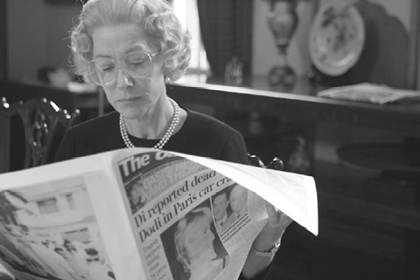By Leonard Quart
In ‘The Queen,’ Blair and Elizabeth II vie for Britain’s soul
The New York Film Festival, taking place right now at Lincoln Center, is an extremely discerning festival, screening only about 25 feature films and a number of shorts that the selection committee feels are the best of the year. Its prime commitment is to further the art of film, and to avoid serving the studios’ publicity machine in any manner. Few of the movies go on to be commercial hits, but being part of the NYFF often means they will at least be shown in a few theaters for discriminating viewers — particularly the opening night film. The NYFF typically begins with an accessible crowd-pleaser, and this year was no different, as Stephen Frears’ “The Queen,” which stars the stately and riveting Helen Mirren, kicked off the festival. Since her Emmy-winning television performance as Elizabeth I, Mirren has established herself as a specialist at embodying royalty. This time, she tries her hand as the controlled, solemn, and dowdy Elizabeth II.
The film begins as Elizabeth wakes up on May 2, 1997 to discover that the people have elected a Labor government after eighteen years of Tory rule. With frosty aloofness, the queen then grants an audience to the nervous new Prime Minister, Tony Blair (Michael Sheen), and his cheeky wife, Cherie (Helen McCrory).
A few weeks later Princess Diana suddenly dies, and that tragedy acts as a catalyst for the bulk of this smartly written, well-acted, dryly witty film, which concentrates on the interactions between a tradition and protocol-bound Elizabeth and a modernizing, opportunistic, much more egalitarian Blair (“call me Tony”), as they struggle with how to deal with her death. At first, the Queen, who had a troubled relationship with Diana (left undefined in the film), remains in isolation and publicly silent at her wooded, rustic Scottish estate at Balmoral, where she spends her days with her dogs, and the contemptuous, blimpish Prince Philip (James Cromwell), and the gin-drinking reactionary, Queen Mother (Sylvia Syms). The royal family, except for the ineffectual, sly, and emotionally vulnerable Prince Charles (Alex Jennings in an understated, nuanced performance), is unwilling to defer to the people’s treatment of Diana as a popular icon, and refuses to hold a public funeral.
But Blair, in his finest hour as a politician, shrewdly understands that Britain has changed. It’s become more emotionally open and even a bit freer of class distinction, and Diana is viewed by the public as the “People’s Princess.” Consequently, by gaining their reluctant agreement to a grand, cathartic funeral for Diana in Westminster Abbey, Blair prevents the royals from self-destructing and undermining the monarchy. That scene, as in others in the film, seamlessly blends dramatic recreations and newsreel footage.
The film depicts only a brief time in the public lives of Blair and the Queen, but conveys much about these two just from this critical encounter. Mirren, evoking a great deal of Elizabeth’s inner life by subtly using her eyes and mouth, captures the dignity and hauteur of a Queen, who looks out at the world from a great remove, and presides over a comically dysfunctional family. (When Princess Margaret’s Tuscan holiday is interrupted by news of the accident, for instance, she remarks that even in death, Diana manages to make trouble for the Windsors.)
And yet, even though Elizabeth may be trapped in a world of outdated and hieratic rituals and out of touch with the public mood, she is a serious woman, free of hypocrisy, and who maintains a profound sense of duty to the monarchy and nation. And Blair, an ambitious pragmatic politico—devoid of any of the Labor Party’s socialist residue—develops a respect for her, recognizing the difficulty of the role she has had to play for over fifty years.
“The Queen” is almost never sentimental or heavy-handed: the film views the monarchy as an ossified institution that is blind to anything outside of its own vision of the world; it also suggests that the Blair of 1997 who is riding high, will one day soon find the people turning against him, as they did against the monarchy; and the outpouring of public feeling towards the privileged, insecure and often silly Diana is implicitly viewed with a jaundiced eye. A clever crowd pleaser throughout, “The Queen” is also a work of substance and subtle suggestiveness.






































